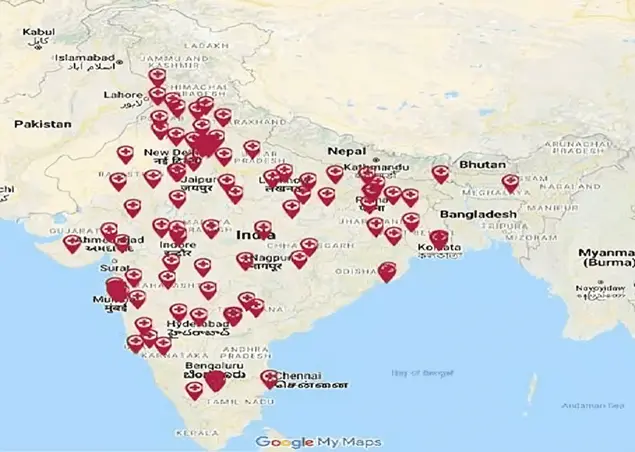What is Infertility?
Infertility is a highly common issue nowadays that can affect any gender. If you're struggling with it, you're not alone. It's estimated that one in eight couples worldwide experiences difficulty conceiving or carrying a pregnancy to term. Despite being a common problem, infertility can be a lonely and emotionally challenging journey. Let us understand Infertility Meaning, Causes, Types and Treatments in details.
Infertility Definition, Causes & Types
The World Health Organization defines Infertility as a disease of the reproductive system when there is a failure to achieve pregnancy after a year or more of regular unprotected sexual intercourse.
Infertility can affect both men and women and can be caused by a wide range of factors, including hormonal imbalances, genetic abnormalities, structural problems, infections, and lifestyle factors such as smoking, alcohol consumption, and obesity. Infertility can be a complex and emotionally challenging issue for individuals and couples who are trying to conceive, but there are a variety of treatments and interventions available to help manage or overcome it.
Fortunately, recent technological advancements and medical treatments have opened up new possibilities for those experiencing infertility. Let's explore its underlying causes, shedding light on the challenges that individuals and couples may face and examining the various solutions and resources available to those seeking to start a family.
This disease impairs one of the body's most basic functions: the inability to get pregnant for the first time or again. It is usually diagnosed when couples continue to fail to conceive. While it may seem like a straightforward issue, infertility is a complex and emotionally charged topic that can profoundly impact people's lives.
Difference between Infertility & Fertility
Fertility and infertility are two terms that are often used when talking about reproductive health. What is Fertility? It refers to the ability to conceive and carry a pregnancy to term. On the other hand infertility refers to the inability to conceive or make your female partner pregnant due to some medical issues, including low sperm count, poor sperm motility, etc.
An individual who is fertile is able to conceive naturally, either through sexual intercourse or with the assistance of reproductive technologies. Fertility is determined by several factors, including the quality and quantity of a person's eggs or sperm, as well as the health of their reproductive organs.
About one-third of all couples encounter infertility problems that either affect both partners or remain unexplained.
Types of Infertility
There are two types of infertility. Primary and Secondary.
1. Primary Infertility: A couple who has never been pregnant and cannot conceive even after trying for more than a year and not using birth control.
2. Secondary Infertility: When a couple is unable to conceive after having one baby. In layman's term, not able to have a second child.
Factors affecting Fertility
Infertility is commonly associated with several risk factors, including:
1. Age: Fertility declines with age in men and women alike.
2. Medical Past: Medical history with polycystic ovary syndrome (PCOS) and endometriosis increases the risk of infertility.
3. Poor Lifestyle: Smoking, excessive alcohol consumption, and obesity can all have an impact on fertility.
4. Toxins in the Environment: Prolonged exposure to certain chemicals, radiation, and other toxins can have an impact on reproductive health.
5. STIs: Sexually transmitted infections can harm the reproductive system and increase the likelihood of infertility.
6. Stress: While stress is not a cause of infertility, it can affect fertility by affecting hormones and menstrual cycles.
Male Infertility Risk Factors & Treatment
Male infertility can be caused by several factors, including:
1. Abnormal sperm production
2. Issues with sperm delivery due to blocked tubes or other structural abnormalities
3. Chronic health conditions, such as diabetes or cystic fibrosis
4. Hormonal imbalances
5. High dosage of steroids
6. Unhealthy habits such as smoking, alcohol consumption, etc.
7. Obesity
Treatment for Male Infertility will be determined by the underlying cause. If a man has a hormonal imbalance, for example, hormone therapy may be prescribed to help restore fertility. Surgery may be required to correct structural defects or blockages in the reproductive system. In some cases, assisted reproductive technology such as (IUI) or (IVF) may be advised.
Aside from medical treatments, lifestyle changes can help improve male fertility. Quitting smoking, drinking less alcohol, maintaining a healthy weight, and avoiding environmental toxins can all help improve sperm quality and quantity. Men experiencing fertility issues should seek appropriate medical care and support to help them achieve their reproductive goals.
Female Infertility Risk Factors & Treatment
Female infertility can be caused by a variety of factors, including:
1. Problems with ovulation, such as (PCOS) or premature ovarian failure
2. Damage or blockages in the fallopian tubes
3. Endometriosis
4. Structural abnormalities in the reproductive organs
5. Chronic health conditions, such as thyroid disorders or diabetes
6. Hormonal imbalances
7. Age-related decline in fertility
8. Chemical related therapies
Again, treatment options vary depending on the underlying cause, which may involve medications like blood tests, surgery to address structural issues or remove scar tissue, and assisted reproductive technologies like IUI or IVF. Lifestyle changes like maintaining a healthy weight, reducing stress, and avoiding smoking and excessive alcohol consumption can also help improve female fertility.
What are the Preventive Measures for Infertility?
Both males and females have the ability to safeguard their fertility, particularly when trying to conceive, by adhering to the following actions:
1. Consume a diet that is well-rounded and maintains healthy body weight.
2. Abstain from smoking, abusing drugs, or excessively drinking alcohol.
3. Seek medical attention for any sexually transmitted diseases.
4. Reduce exposure to harmful substances.
5. Maintain physical activity, but avoid excessive exercise.
There are various complexities associated with infertility, including its impact on your emotional well-being and relationships. Furthermore, infertility treatments can be expensive and can cause financial stress.
By consulting the best healthcare provider, the root cause of infertility can be identified, which is the first step in determining the most effective treatment for achieving your goal of starting a family. You can always visit your nearest Indira IVF Centre and discuss the best treatment options for you. To schedule a visit to our centre near you, please reach out to us at 18003092323.
Pregnancy Calculator Tools for Confident and Stress-Free Pregnancy Planning
Get quick understanding of your fertility cycle and accordingly make a schedule to track it
Get a free consultation!















